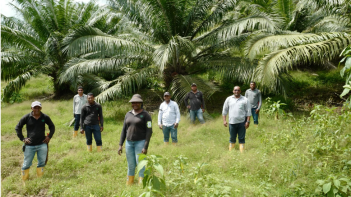Brazilian company Belem Bioenergia Brasil (BBB) has successfully reached a sustainability milestone by obtaining RSPO Certification in August 2023. Specialised in the production of palm oil, palm kernel oil and its refined counterparts (RBD palm oil), BBB is committed to the implementation of sustainable agricultural and industrial activities carried out in the state of Pará in northern Brazil. Producing 153,670 metric tonnes (MT) of certified sustainable palm oil (CSPO), the company consolidates Latin America’s robust CSPO production to over 2.2 million MT.
To mark this accomplishment, RSPO caught up with Gilberto Cabral, Sustainability and Agricultural Partnerships Manager of BBB, to get his insights on the specific challenges the Brazilian palm oil market faces, as well as the positive impacts the company has seen since undertaking the certification process, including improved internal operations and development in surrounding local communities.
When did the certification process for BBB begin, and why was it important for the company to undergo this process?
Our certification process started in 2019 when our shareholders and Executive Board made the decision to get RSPO Certification. We took actions to formalise all the company’s operational and administrative procedures, and a preliminary audit was conducted to identify gaps. The due diligence required by the RSPO Standard began in September 2020 with the hiring of specialised consultants, which was a significant milestone for us. The company already had good practices in place in several of our processes, so the decision to obtain RSPO Certification accelerated the improvement of these processes and strengthened BBB’s sustainability footprint.
In Brazil, what are some of the major sustainability challenges in the palm oil industry?
Without a doubt, cost management requires constant attention. Brazilian labour laws are very strict compared to those of other palm oil-producing countries, which places a burden on Brazilian palm oil producers.
Additionally, two important cultural aspects are at play – the first is showing that the palm oil industry in Brazil and Latin America has implemented activities without damaging forests, having carried these out in pasture areas or degraded areas, as is the case with BBB. Another important aspect is demonstrating that it is possible to live in harmony with local communities, creating a positive impact in terms of food security and circular economy, as well as preventing internal migration.
What were the critical steps that BBB took to obtain certification?
The commitment and support from top management and the management team is key, as they must understand the benefits of obtaining certification. Other critical factors were the implementation of an integrated management system to ensure the ongoing maintenance and training of formalised processes, management of legal requirements and non-conformities, conducting internal audits and preparing the due diligence, and monitoring of compliance with regulatory requirements in all areas.
What were the key lessons learned from the certification process?
The lessons are numerous, mainly that the company as a whole is better with certification and creates a basis for continuous improvement and innovation, and being detail-oriented. It also boosts team spirit since it is a joint achievement that must be maintained by everyone. The perspective towards the environment and people also changes, and the company becomes more inclusive and welcoming.
Certification also induces this cultural change towards social and environmental responsibility. Moreover, the market becomes more receptive, and we attract new customers.
Finally, what message would you like to share to convince more companies to explore RSPO certification?
Certification reinforces attention to legal processes, avoiding costs associated with losses and fines. Formalised procedures ensure standardisation and operational continuity, encouraging training of new employees, while amplifying social and environmental responsibility, and taking care of the surrounding communities. I am enthusiastic about certification – the effort is worth it.
Keep reading

Access into prisma

Updated Trace Function in prisma

Call for Expression of Interest: Independent Investigation of a Complaint

Latin American Smallholders, Key Global Brands Gather in Peruvian Amazon to Advance Sustainable Palm Oil

RSPO Forum for Members and Certification Bodies 2025: Strengthening Capacities and Building Bridges with RSPO Members

From Violence to Prosperity: Cultivating Sustainable Palm Oil in San Pablo, Colombia

Palmas de Tumaco: Enduring, Trusting, and Transforming in Colombia’s Pacific Coast
Carry Over Credits for Certified Independent Smallholder Groups




